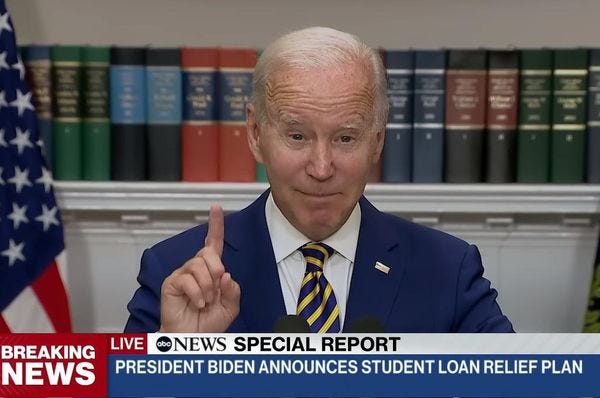What Good Arguments Will Supreme Court Ignore In Student Debt Relief Case?
Maybe they'll be persuaded by logic and reason. Maybe monkeys will fly out of Alito's butt.
The Supreme Court will hear oral arguments today on the Biden administration's plan to relieve student loan debt by up to $20,000 per borrower. If you want to listen live, audio will be streaming at 10 Eastern. Joe Biden proposed the plan back in August, and various rightwing legal groups immediately went to work finding plaintiffs to sue to stop it, which turned out to be a challenge because to have standing, a plaintiff would have to prove they'd been harmed by a good thing. Eventually, they got lower federal courts to block the program. As a result, not a penny of student debt has yet been forgiven, even for the roughly 16 million folks the Education Department has already approved for debt forgiveness, or for the 10 million other borrowers waiting to have their applications processed.
Under the Biden plan, borrowers could have up to $10,000 of student debt forgiven if they had annual income less than $125,000 (or $250,000 for married folks filing jointly). People who received Pell Grants in college would have up to $20,000 in debt cancelled. The loan forgiveness would be tax free, and 90 percent of the debt relief would go to borrowers making $75,000 a year or less. The proposal was solidly targeted at middle and lower-income borrowers, and what with the $20K in relief for Pell grant recipients, would eliminate student debt for about half of borrowers.
And who knows, maybe the Supremes will decide the program can go forward once it decides the case. We like nice surprises!
READ MOAR:
Here's Joe Biden To Tell You How He'll Cancel Assloads Of Student Debt!
Joe Biden CANCEL CULTURES Student Debt! So How Do You Get You Some Of That?
Joe Biden Asks Supreme Court To Let Him Forgive Student Loans, If That's Not Too Much Trouble
Joe Biden Ready To Cancel Supreme Court's College Loans Or Something
In a brief filed in January, the Biden administration outlined its legal strategy in appealing two cases brought by opponents of the law. The administration will argue that it has the authority to forgive student debt under the 2003 HEROES Act, which enables the Education Department to waive student debt obligations during times of national emergency. And hey, we have us a national emergency, what with the COVID pandemic and the resulting economic disruption.
Federal student loan payments (for most borrowers) have been in a moratorium since March 2020, and the administration also argues that requiring people to start paying loans again all at once could lead to a financial emergency if some of that debt isn't relieved, noting that
ending that pause without providing some additional relief for lower-income borrowers would cause delinquency and default rates to spike above pre-pandemic levels. This Court should not compel that damaging and destabilizing result.
Given that the Supremes have demonstrated they don't give a community college rat's ass about the real-world consequences of their decisions on abortion and guns, only on the imaginary views of the Founders, that argument may carry less weight.
The plaintiffs in the case include a group of six Republican-led states that sued to overturn program, arguing that debt relief will deprive them of revenue. That lawsuit was combined with a second case filed by a rightwing group on behalf of two borrowers who didn't qualify for the program, and are arguing that this food is terrible — and such small portions! Here's a summary from the Associated Press:
A lower court dismissed the lawsuit involving the following states: Arkansas, Iowa, Kansas, Missouri, Nebraska and South Carolina. The court said the states could not challenge the program because they weren’t harmed by it. But a panel of three federal appeals court judges on the U.S. Court of Appeals for the 8th Circuit — all of them appointed by Republican presidents — put the program on hold during an appeal . The Supreme Court then agreed to weigh in .
The students’ case involves Myra Brown, who is ineligible for debt relief because her loans are commercially held, and Alexander Taylor, who is eligible for just $10,000 and not the full $20,000 because he didn’t receive a Pell grant. They say that the Biden administration didn’t go through the proper process in enacting the plan, among other things.
Texas-based U.S. District Judge Mark Pittman, an appointee of President Donald Trump, sided with the students and ruled to block the program. Pittman ruled that the Biden administration did not have clear authorization from Congress to implement the program. A federal appeals court left Pittman’s ruling in place, and the Supreme Court agreed to take up the case along with the states’ challenge.
The main questions that are likely to come up will involve two main areas: Do the plaintiffs actually have standing to sue at all — that is, can they show they've actually been harmed? And then the other big deal question is whether the HEROES Act actually does allow the administration to forgive debts.
Here's the PBS NewsHour linky for you to listen to the arguments, if you dare.
[ AP / Biden V. Nebraska brief]
Yr Wonkette is funded entirely by reader donations. If you can, please give $5 or $10 monthly so we can keep you up to date!





Tell that to all the rich fat cats, like Trump, who run their businesses into debt and then declare bankruptcy.
Post secondary education should only be for the wealthy.
In the meantime, lets complain about low wage workers asking for a living wage, berating them for not furthering their prospects as well as bitch about foreigners with advanced degrees coming to the United States and taking jobs that Americans are not filling because they cannot afford the education.